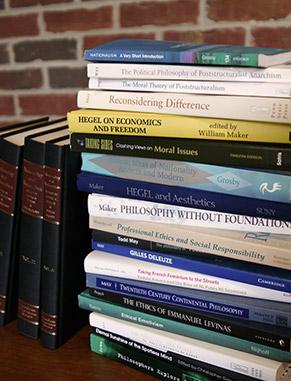Philosophy is famously mocked as the undergraduate major that has the most potential to land young adults in unemployment. It somehow retains this status even as its students achieve high scores on the GRE, become likely candidates for law school, and are among the most successful journalists and doctors. Contrary to popular belief, the technology era has not rendered philosophical research and methods irrelevant. Instead, it’s high time philosophy returned to its place of prominence in the curriculum of all levels of education.
The political left consistently advocates for the importance of federally funded education. If education provides an intellectual survival kit, then it seems only right that quality education be offered universally. The benefits of this are clearly multi fold: a more educated populace can lead to increased productivity, potential for societal intellectual contribution and better quality of life. However, simply funding schools is insufficient for securing higher standards of education. Instead, there must be drastic changes in school curriculum. I argue that a critical first step should be instituting philosophy classes in K-12 schools.
Philosophy is typically a subject only accessible at the collegiate level. While some private schools and certain public schools may offer a handful of philosophically oriented courses, most students arrive at university still unsure of how philosophy and psychology differ. This phenomenon represents a major failing of public education.
I understand that philosophy is avoided in primary education due to the academic maturity that educators believe its study requires. While these assumptions are certainly applicable to high level philosophical thought, their pervasion in the minds of high school educators is problematic. I grant that philosophy is different in nature than history, politics and English in the sense that some of the most basic concepts of philosophy are ones that are not easily accessible. For instance, a student can obtain a passable understanding of the three branches of government without learning about all of the nuances that underlie them. However, it is a little more difficult to obtain this same baseline understanding of Plato’s tripartition argument without parsing out all of the metaphysical and epistemological claims that surround it. This results partially from the admittedly complex nature of philosophical material but mostly from the societal norms that govern which concepts students are familiar with. Most students have some concepts of political structures and historical events before learning about them formally simply because they are talked about in the everyday. Philosophical concepts do not often have this same luxury.
A lack of societal normalcy is an insufficient reason for abstaining from teaching philosophy in schools. While incorporating philosophical thought into secondary school curriculum will require added effort on the part of textbook authors and educators, I’m inclined to argue that philosophy’s benefits will far outweigh its costs. Philosophical methods are crucial for cultivating critical thinking skills and supplying future generations with the intellectual toolboxes necessary for navigating the global crises that they’ll inevitably inherit.
When most Americans observe political debates, news commentators or societal crisis, they often lament what has come to be “the lack of critical thinking in America.” It doesn’t take much socializing to hear about the absence of logic and rationality that many Americans currently take their neighbors to have. However, these grievances are often coupled with advocating for funding STEM programs at the expense of humanities programs both at the college and high school levels. Those who dismiss seemingly impractical disciplines like philosophy while simultaneously lamenting about the lack of rational thought in the American populace unfortunately have no conception of how blatantly inconsistent their beliefs are.
If we wish to emerge successfully from the multidimensional global issues we will continue to face, then we must make sure we’re equipped with the best cognitive skillets possible. While we can certainly turn to history for answers, it’s worth noting that most of the historical figures we most revere were scholars of philosophy and rhetoric. We should thus strive to mold our characters after theirs both in theory and in practice.
As of now, the U.S. public education system nurtures thousands of brilliant minds each year. However, there is ample room for improvement. Our educators need not feel pressured with innovating elaborate new technology oriented curricula to enrich and better the learning experiences of our students. Instead, they should look back to a method that has proven itself successful in cultivating ingenious and critical thinkers for centuries on end. It’s time to return to thinking for the sake of thinking.




